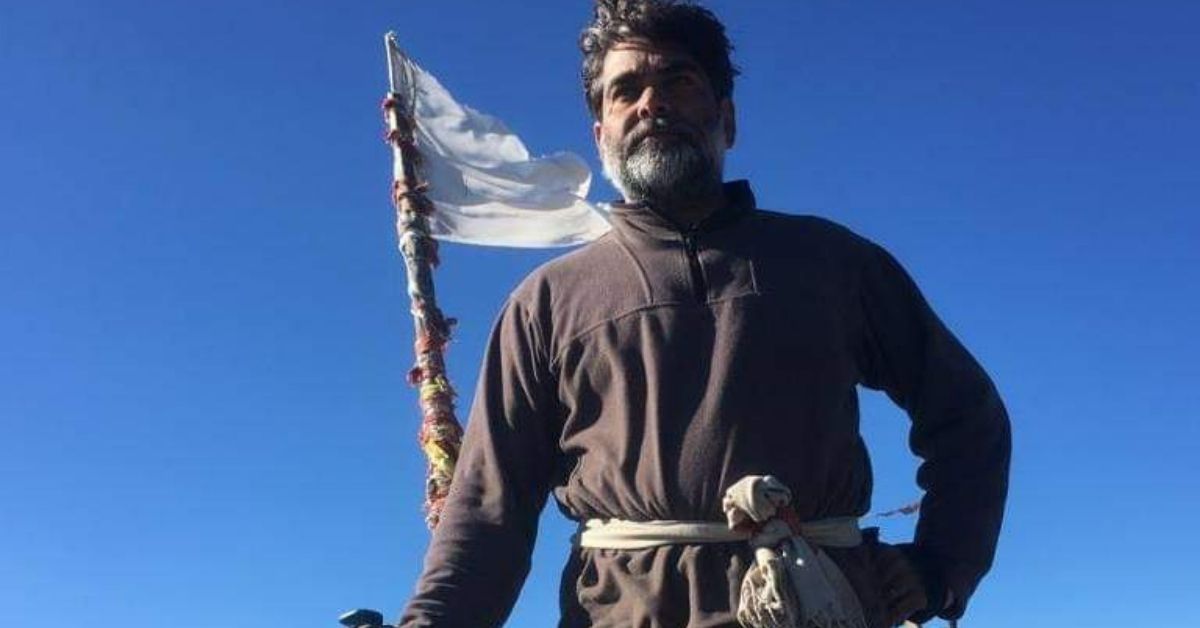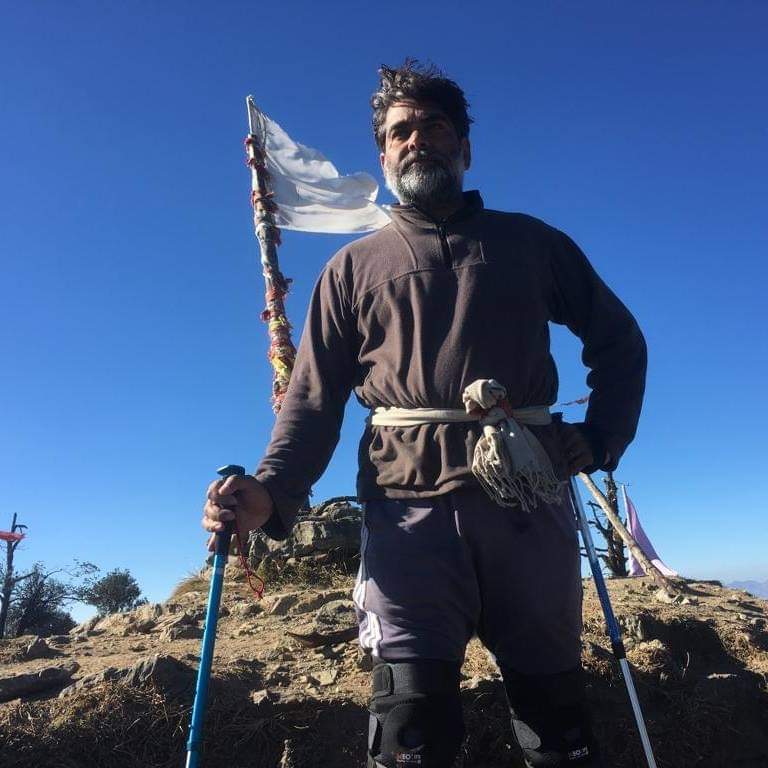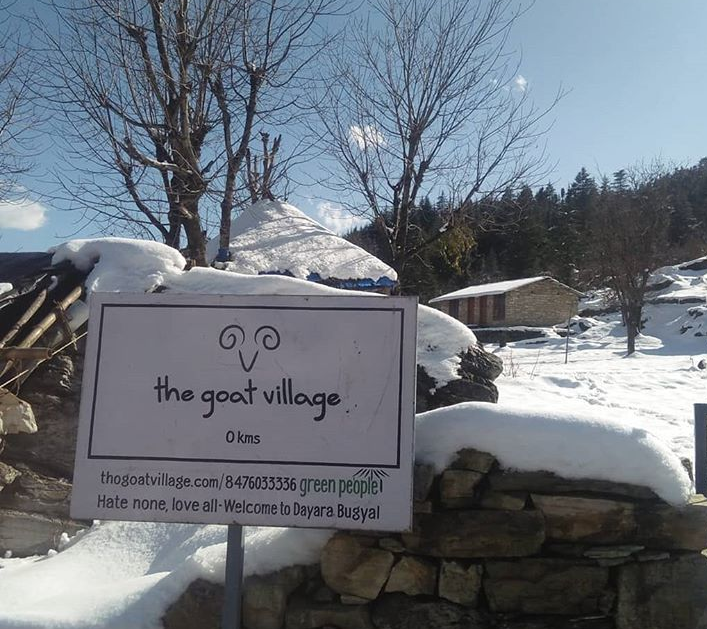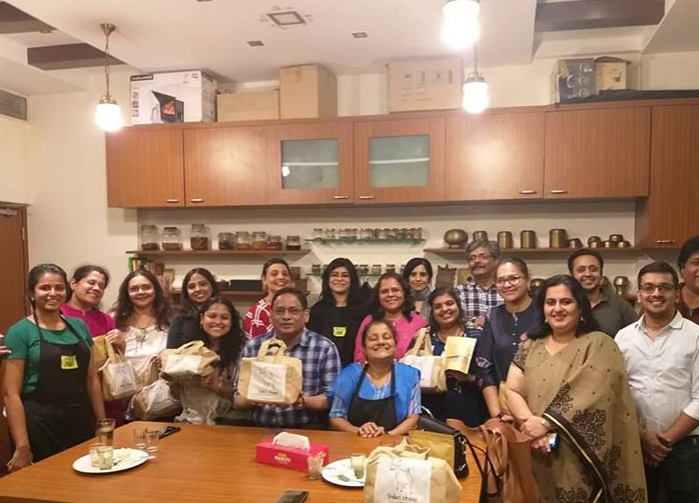42-YO Breathes Life Into Ghost Villages With Natural Farming, Rural Tourism!
The incredible impact has led to reverse migration as nearly 25 families that had left the villages in search of better opportunities have returned!

Nestled in the lap of Garhwal Himalayas, the picturesque Nag Tibba village is now gaining prominence among the local farming community.
From horse gram, amaranth to different types of millets, the crops grown in Nag Tibba (which translates to Serpent Peak) are power packed with nutrients.
You can check out organic produce by Bakri Chap here at The Better India Shop.
The village, which is now bustling with energy and several agricultural activities, was once an abandoned and neglected area.
In 2013, dust and cobwebs smothered the village, Rupesh Rai, the Founder & Managing Director of Green People tells The Better India.
Likewise, most of the inhabitants of more than 1,800 remote villages situated in the heart of Himalayas migrated to urban areas either in search of livelihoods or due to natural disasters like the Kedarnath catastrophe in 2013.

Disturbed at this deplorable plight of villages that are rich in natural resources, Rupesh took it upon himself to help revive the livelihoods of the people who had stayed behind.
He launched his social enterprise, Green People in 2015. It comprises of a community that works toward ecologically responsible agro-tourism movement.
We wish to make the Land of the Gods the heaven it was. We work toward letting the people of the hills stay and take up occupations that are gradually becoming redundant. We desire to promote the development of the people and the ecology too, he says.
Green People works with more than 500 farmers and functions in four regions of the three districts of in Uttarakhand, Tehri, Uttarkashi & Nainital.
How It All Started

Few months after the Kedarnath disaster in 2013, Rupesh visited the region to help a friend in the restoration and rehabilitation work. “It was one of the biggest calamities in India in terms of scale and magnitude that affected the entire Himalayan region,” he says.
Rupesh saw the degree of devastation in the number of dead bodies, collapsed buildings and a tremendous amount of debris that had killed thousands of people.
The expedition shook him from within, and for days the memories haunted him. It made him contemplate his every action and the greed of people in their overconsumption and its impact on ecology.
It was during the same time when Rupesh met a decorated army officer (Retd) Col. Ajay Kothiyal. For nearly six months, the duo studied the Himalayan villages to identify the most cherished resources.
In 2015, he officially launched Green People with the financial support of Col Kothiyal and some of his own savings, “We decided to purchase goats and sell milk and cheese to attract the youth from the villages.”
However, the project did not work out as expected due to the undernourished goats in the region; however, this setback later translated into a unique event called Bakri Swayamvar, launched with the intent of gene pool diversification of goats.
He also started a homestay initiative called ‘Pay At Your Own Will’ to bring visibility to the lesser known Himalayan regions. The homestays are attracting hordes of new age eco-conscious responsible travellers. One lot among the tourists were a set of well-known chefs who happened to be Rupesh’s friends and acquaintances.
The chefs helped him understand that the indigenous millets, pulses, cereals and honey produced by the marginalised high altitude farmers are now considered super foods and are most sought after in the urban areas.
“However, the farmers did not get a fair price for their produce due to middlemen and the absence of the right kind of market linkage,” tells Rupesh.
And to mitigate the problem, he launched his farming project.
42-year-old Rupesh is firmly committed to increasing local productivity by engaging youth and farmers. His wife Vandana, lives in Greater Noida along with their 16-year-old daughter and looks after the financial management and distribution of Green People.
The Bakri Chap Project

As a tribute to the failed goat’s milk project, Rupesh christened the farming project as ‘Bakri Chaap’. With Green People’s guidance and training, the farmers not only enhanced their output but also started assisting the team in the packaging process.
The Project grows several pulses, grains, cereals, fruits, mono flora, wild honey, different types of millets and high yielding vegetables across 15 villages. The customer base of their naturally grown produce range from luxury hotels like Taj, JW Marriott to chefs and customers in big cities including Kolkata, Chandigarh, Rishikesh, Mumbai and Delhi.
Some of the renowned culinary experts, a few celebrity chefs and bloggers from the metropolitan cities also vouch for it [the produce]. As a support to the marginalised Himalayan farmers, some of them volunteer as brand ambassadors of Bakri Chhap, Mani Mahesh, Head of Bakri Chap tells TBI.
The mobile collection centre of Green People gives on-spot payments to the farmers for their produce. The pay is 20 per cent higher than the local mandi (market) rates.

Confirming the same to TBI, 51-year-old Surendra Bhandari who has been farming for the last 20 years, says,
I live in Pantwari village and used to send my produce to the city markets. Then I started selling in my village but it fetched minimal prices. My income has increased by 15-20 per cent after I started selling it to Green People.
Since the inception of Bakri Chhap, around 25 families, who had left the villages in search of better opportunities, have come back.
As soon as the traditional farming resumed, and revenue came back, we saw reverse migration. To keep the momentum going, we constantly engaged the farmers in skill development workshops, says Mani who quit his thriving job in Delhi a few years ago to help out the local farmers.
26-year-old Mani has also seen a massive transformation among the farmer’s community, “Earlier the farmers were very skeptical about what they produced. But now, with Bakri Chhap, they have realised that their produce is profitable.”

Echoing his words, Rupesh says, “Higher the altitude lower was the self-esteem of the farmers. But now they know that the produce of financially weak people in the higher altitude region is the medicine for the emotionally bankrupt but financially strong people.”
Reviving Rural Tourism With an Eco-Friendly Twist

Pay As You Like is another project run by the Green People. This initiative owns traditional houses in far-flung areas, and some of them are managed by the local youth who are first trained at five-star hotels.
With a zero tolerance policy towards plastic items and littering, the homestay cottages are entirely environment-friendly. Instead of electricity, they use solar power, and due to adverse road connectivity, the visitors have to leave their vehicles outside the respective villages.
It promotes farm retreats/ homestays and helps revive abandoned villages by leveraging their tourism potential.
More than 100 community-run homestays and 300 mule owners are foreclosing their loans, and getting free insurance. The homestays also provide free computer education to village kids in Jaunpur region of Tehri.

Poor mobile network often urges tourists to interact with the farmers and learn about their agricultural activities.
Running amok is just fine with us. So is a good laugh but try and maintain harmony with nature without disrupting the rhythm we are trying to preserve. With all those thoughts and promises in place, have a pleasant stay, reads the policy.
The Way Forward

Green People hopes to develop homestays in rural India with a pro-people and pro-planet approach. They want village stays to act as a mini collection and retail outlet for the marginalised farmer’s brand, Bakri Chhap thus bringing value addition and integrated development approach in the rural ecosystems of India.
There are around 6,50,000 villages in India, with a huge amount of unutilised inventory – each having a unique untold tale to tell. The revenue coming from urban space to rural space will act as a catalyst to protect and promote more sustainable and traditional ways of green living, he signs off.
You can check out organic produce by Bakri Chap here at The Better India Shop.
(Edited by Saiqua Sultan)
Like this story? Or have something to share?
Write to us: [email protected]
Connect with us on Facebook and Twitter.
If you found our stories insightful, informative, or even just enjoyable, we invite you to consider making a voluntary payment to support the work we do at The Better India. Your contribution helps us continue producing quality content that educates, inspires, and drives positive change.
Choose one of the payment options below for your contribution-
By paying for the stories you value, you directly contribute to sustaining our efforts focused on making a difference in the world. Together, let’s ensure that impactful stories continue to be told and shared, enriching lives and communities alike.
Thank you for your support. Here are some frequently asked questions you might find helpful to know why you are contributing?


This story made me
-
97
-
121
-
89
-
167













